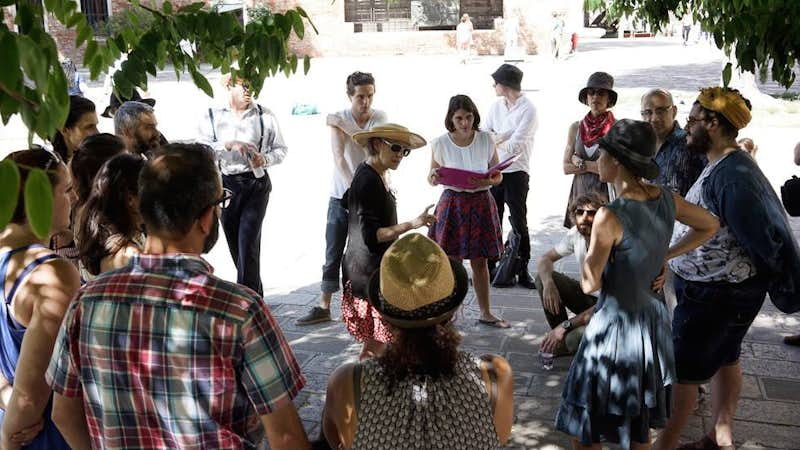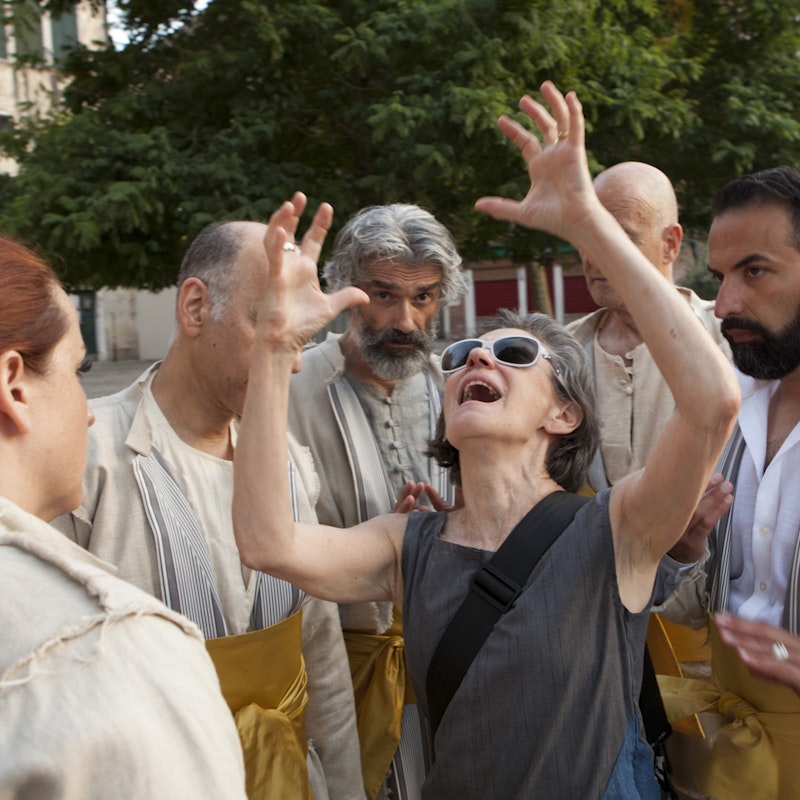Breaking the Fourth Wall: Reinventing Shakespearean Performance
In the heart of the Jewish Ghetto in Venice, Italy, Karin Coonrod ’75 directed "The Merchant of Venice," followed by a mock trial for the play’s main character held by Supreme Court Justice Ruth Bader Ginsburg.

Posted on September 7, 2016 by College Communications in Alumni Stories, Featured.
Tragedy, comedy, romance, villainy—these are some of the key ingredients in a Shakespearean play. With unforgettable characters and gripping plot lines, the works of William Shakespeare have withstood the test of time, performed all over the world in front of countless audiences for centuries.
For the 400th anniversary of the famous playwright’s death, Karin Coonrod ’75 directed The Merchant of Venice in the heart of the Jewish Ghetto in Venice, Italy, commemorating its own quincentennial anniversary. In conjunction, Supreme Court Justice Ruth Bader Ginsburg held a riveting mock trial for the play’s most incendiary character, Shylock.
A Jewish merchant, “Shylock is an outsider, a stranger to the Venetians in the play,” Coonrod explains. “The Venetians had their own corrupt money system and for starters, Shylock speaks a different language, calling upon a history that is not apparent to the secular Venetians.”
A signature component of Coonrod’s performance is the reimagining of this main character, who is traditionally portrayed as a greedy comic villain or a pathetic victim. In a creative twist, she explains, “I wanted to open up the character of Shylock and look into the complexity of his humanity by sharing the role between five actors—four men and one woman—who would each take one of the five Shylock scenes.”
[caption id="attachment_3797" align="alignright" width="400"] Coonrod, with the five Shylocks in Venice[/caption]
Coonrod notes that in addition to five Shylocks, there are five windows (representing the five books of the Torah) on the two synagogues hovering over the space in the Ghetto—and of course, 500 years to commemorate. “All of this was for me a kind of endorsement to listening hard to what the project wants to be,” she says. “The connection this play has to history is much bigger than what we see.”
After a stunning opening night, Justice Ginsburg presided over a mock trial of Shylock as part of a fundraising event for the play. The appeal took place in front of an audience of (fittingly) 500 at the Scuola Grande di San Rocco.
In the original script, Shylock seeks his forfeit in a salacious agreement made between merchants. The bond takes on a deeper dimension when his daughter elopes with a “Christian” and steals her father’s money. As Shylock seeks revenge, he is outsmarted and forced to convert to Christianity—“the politically correct religion of the Venetians,” Coonrod explains. But during the mock trial, appeals and testimonies lead to the verdict delivered by Justice Ginsburg: Shylock must be paid his debt, and his conversion is overturned.
The final Merchant performance took place at the Padova Prison, where Coonrod says, “the attention in the room was remarkable” as questions of mercy and justice played out on stage. “At the play’s end, actors and inmates were hugging and crying for the quality of the connection in this rare encounter of the outsiders and insiders in the belly of a prison.”
Though based in New York, Coonrod’s Compagnia de’ Colombari was born in Orvieto, Italy, beginning with the performance of the medieval mystery plays—Strangers and Other Angels—for consecutive years starting in 2004, Giulia in 2012 and Monteverdi’s Orfeo in 2014. All performances were in partnership with the Studio for Art, Faith and History, the public extension of Gordon IN Orvieto founded by Dr. John Skillen, senior advisor for Global Education at Gordon.
Coonrod is a lecturer in directing at Yale School of Drama. In February, Compagnia de’ Colombari will tour her own texts&beheadings/ElizabethR play, which was staged at BAM/Next Wave Festival last year. The Merchant of Venice will have its North American premiere at Peak Performances in Montclair, New Jersey, in September of 2017.
By Alex Rivera ’16, English language and literature
Coonrod, with the five Shylocks in Venice[/caption]
Coonrod notes that in addition to five Shylocks, there are five windows (representing the five books of the Torah) on the two synagogues hovering over the space in the Ghetto—and of course, 500 years to commemorate. “All of this was for me a kind of endorsement to listening hard to what the project wants to be,” she says. “The connection this play has to history is much bigger than what we see.”
After a stunning opening night, Justice Ginsburg presided over a mock trial of Shylock as part of a fundraising event for the play. The appeal took place in front of an audience of (fittingly) 500 at the Scuola Grande di San Rocco.
In the original script, Shylock seeks his forfeit in a salacious agreement made between merchants. The bond takes on a deeper dimension when his daughter elopes with a “Christian” and steals her father’s money. As Shylock seeks revenge, he is outsmarted and forced to convert to Christianity—“the politically correct religion of the Venetians,” Coonrod explains. But during the mock trial, appeals and testimonies lead to the verdict delivered by Justice Ginsburg: Shylock must be paid his debt, and his conversion is overturned.
The final Merchant performance took place at the Padova Prison, where Coonrod says, “the attention in the room was remarkable” as questions of mercy and justice played out on stage. “At the play’s end, actors and inmates were hugging and crying for the quality of the connection in this rare encounter of the outsiders and insiders in the belly of a prison.”
Though based in New York, Coonrod’s Compagnia de’ Colombari was born in Orvieto, Italy, beginning with the performance of the medieval mystery plays—Strangers and Other Angels—for consecutive years starting in 2004, Giulia in 2012 and Monteverdi’s Orfeo in 2014. All performances were in partnership with the Studio for Art, Faith and History, the public extension of Gordon IN Orvieto founded by Dr. John Skillen, senior advisor for Global Education at Gordon.
Coonrod is a lecturer in directing at Yale School of Drama. In February, Compagnia de’ Colombari will tour her own texts&beheadings/ElizabethR play, which was staged at BAM/Next Wave Festival last year. The Merchant of Venice will have its North American premiere at Peak Performances in Montclair, New Jersey, in September of 2017.
By Alex Rivera ’16, English language and literature

Share
- Share on Facebook
- Share on X (Formerly Twitter)
- Share on LinkedIn
- Share on Email
-
Copy Link
-
Share Link
Categories
Categories
Archives
- April 2025
- March 2025
- February 2025
- January 2025
- December 2024
- November 2024
- October 2024
- September 2024
- August 2024
- July 2024
- June 2024
- May 2024
- April 2024
- March 2024
- February 2024
- January 2024
- December 2023
- November 2023
- October 2023
- September 2023
- August 2023
- July 2023
- June 2023
- May 2023
- April 2023
- March 2023
- February 2023
- January 2023
- December 2022
- November 2022
- October 2022
- September 2022
- August 2022
- July 2022
- June 2022
- May 2022
- April 2022
- March 2022
- February 2022
- January 2022
- December 2021
- November 2021
- October 2021
- September 2021
- August 2021
- July 2021
- June 2021
- May 2021
- April 2021
- March 2021
- February 2021
- January 2021
- December 2020
- November 2020
- October 2020
- September 2020
- August 2020
- July 2020
- June 2020
- May 2020
- April 2020
- March 2020
- February 2020
- January 2020
- December 2019
- November 2019
- October 2019
- September 2019
- August 2019
- July 2019
- June 2019
- May 2019
- April 2019
- March 2019
- February 2019
- January 2019
- December 2018
- November 2018
- October 2018
- September 2018
- August 2018
- July 2018
- June 2018
- May 2018
- April 2018
- March 2018
- February 2018
- January 2018
- December 2017
- November 2017
- October 2017
- September 2017
- August 2017
- July 2017
- June 2017
- May 2017
- April 2017
- March 2017
- February 2017
- January 2017
- December 2016
- November 2016
- October 2016
- September 2016
- August 2016
- July 2016
- June 2016
- May 2016
- April 2016
- March 2016
- February 2016
- January 2016
- December 2015
- November 2015
- October 2015
- September 2015
- August 2015
- July 2015
- June 2015
- May 2015
- April 2015
- March 2015
- February 2015
- January 2015
- December 2014
- November 2014
- October 2014
- September 2014
- August 2014
- July 2014
- June 2014
- May 2014
- April 2014
- March 2014
- February 2014
- January 2014